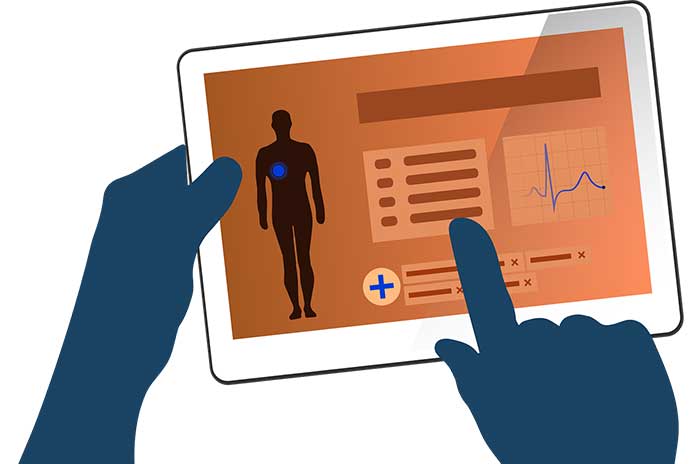Medical data hold numerous potentials for digitization in healthcare. They can be the key to early disease detection and personalised treatments, thus contributing to optimal patient care. The Baden-Württemberg Council of Ministers would now like to use all possibilities for merging the data to promote the state’s attractiveness as a health location.
In the future, Baden-Württemberg should exploit the potential of digitization in the healthcare system, which was decided at a meeting of the state cabinet. In this context, medical data and their availability and usability are of particular interest, not only for medical service providers but also for the areas of pharmaceutical and medical technology as well as for biotech companies. Central to this is the protection of data protection.
Sensitive health data requires special protection. According to the state cabinet, the aim must be to strengthen the European idea of data protection in the global competition to observe these standards. This is the only way to ensure that the federal government and the individual states are perceived as attractive healthcare locations.
However, since big data and artificial intelligence (AI) – two areas whose function is based on large amounts of data – are of interest in healthcare, the handling of health data has to be rethought in part. This is because the data protection principle of data minimization and the associated data economy is often equated with data protection. However, given the progress of digitization, it should not be maintained.
The “Forum Gesundheitsstandort BW,” founded in 2018 with more than 500 experts from hospitals and care facilities, research institutions, and universities as well as biotech, pharmaceutical, and medical technology companies from Baden-Württemberg now wants the targeted digital use of health data for the further development of health care in the state advance. All legal, technical and organisational regulations and various interests should be taken into account. On the “Roadmap Health Data Utilisation Baden-Württemberg,” the cabinet has now recorded all measures that have already been implemented and are planned to implement this goal, formulating various focal points.
Harmonisation Of Data Protection Regulations
Many competent authorities and state legal requirements combine medical research projects with an enormous bureaucratic effort. The Baden-Württemberg Health Location Forum is intended to ensure that the specifications are coordinated to reduce hurdles. The data protection conference should also be consulted on this.
The State Commissioner for Data Protection and Freedom of Information (LfDI) should ask her for suitable procedural regulations to harmonise the processing and decision-making if several supervisory authorities are involved. In addition, uniform specifications for the anonymization and pseudonymization of health data are developed.
Furthermore, the project should also be promoted at the federal level. To this end, the Healthcare Location Forum plans a central contact point or a decision-making body that can take appropriate measures if there are discrepancies between different supervisory authorities.
Standardisation Of Health Data
Health data are potential carriers. However, they bring hurdles that must be overcome if all their potential is realised. Data sets must be standardised and interoperable to make them usable in health care and medical research. However, the technical requirements to network the different IT structures sustainably and securely still must be created.
The processes involved in applying access to health data, which are still very inconsistent, must also be optimised. Therefore, standardised applications and improved access to data are decisive factors in the plan to make Germany competitive as a science location.
The Healthcare Location Forum should take care of further developing the technical and organisational requirements. The aim is to link and use data across institutions and locations and thus make uniform nationwide access to health data possible.
Private Sector Access To Relevant Data
Private-sector and public-interest-oriented research should also have access to relevant health data while respecting personal rights since research and development do not only occur in academic structures. Nevertheless, only public and public institutions have had access to health data so far.
Since the patient data protection law (PDSG) expressly excludes the industry from using the electronic patient record (EPA), a change in social security law is necessary.
Strengthening Digital Skills In Healthcare Professions
The health care system is subject to the change of digitization because medical staff must also adapt to the changes and be able to act within the newly created framework. This requires training, further education, and advanced training. The digital competence of the specialists by changing knowledge and information situations is an essential component in strengthening Germany as a health location.
Strengthening The Digital Health Literacy Of Citizens
Projects and information campaigns should also strengthen the digital health literacy of the population to explain the benefits of digital data, their exchange, and their networking. Due to the sensitivity of health data, their processing is often associated with doubts.
However, since EPA and Co. stand and fall with the voluntary release of data, it is essential to ensure that the general public understands the benefits of the data and the purpose for which they are used. The Advisory Council for the Assessment of Developments in the Healthcare System, therefore, recommends “a coordinated and targeted explanation of the purpose, structure and benefits, including possible risks, of an electronic patient file in order to increase its use and to enable the insured to use it in their own health interests.”
Also Read: How To Implement Process Complex Data Successfully
